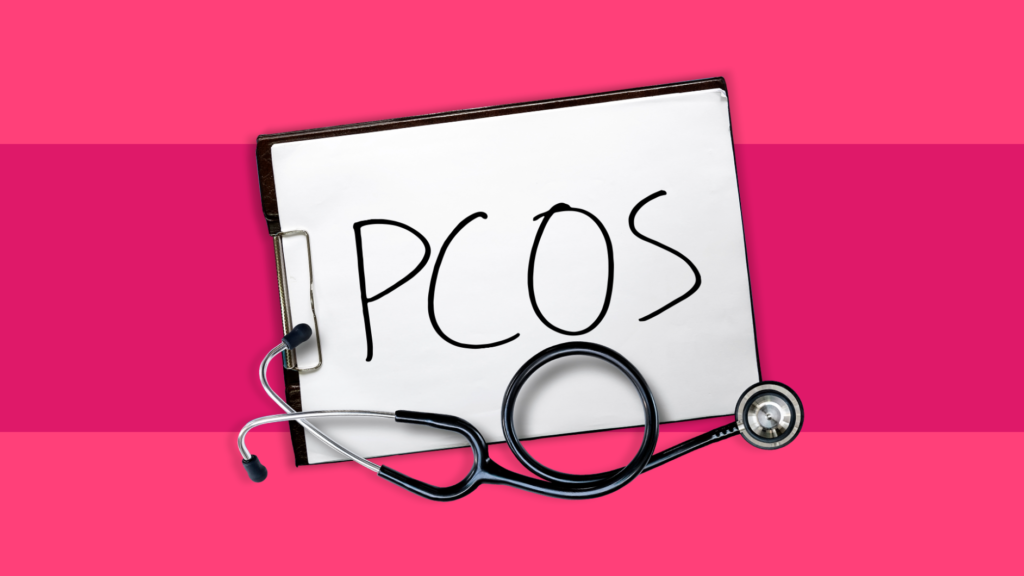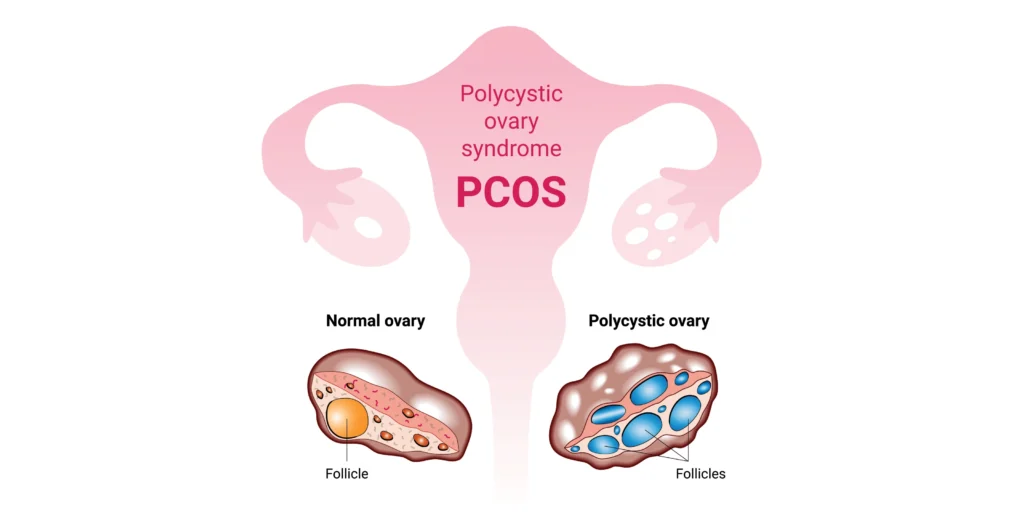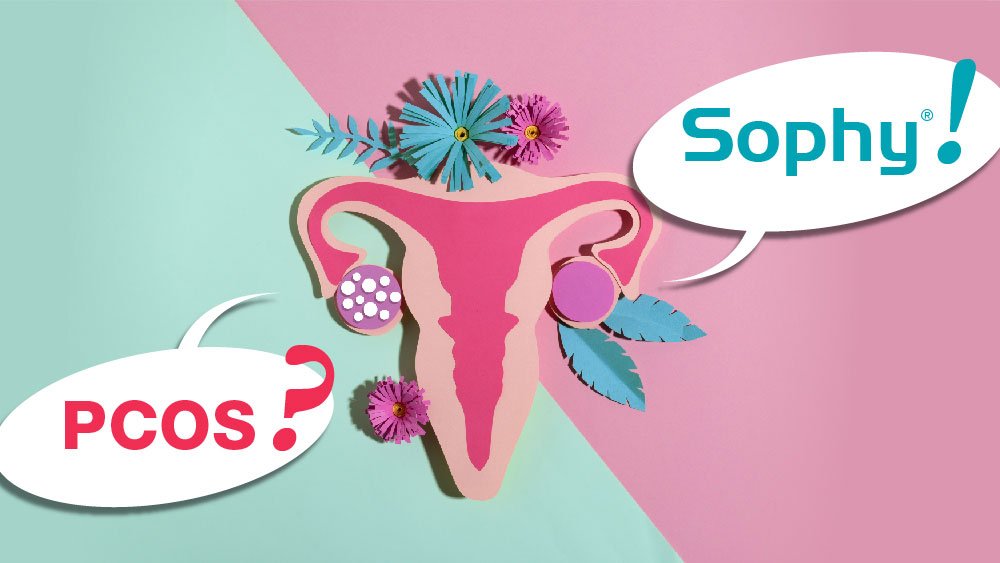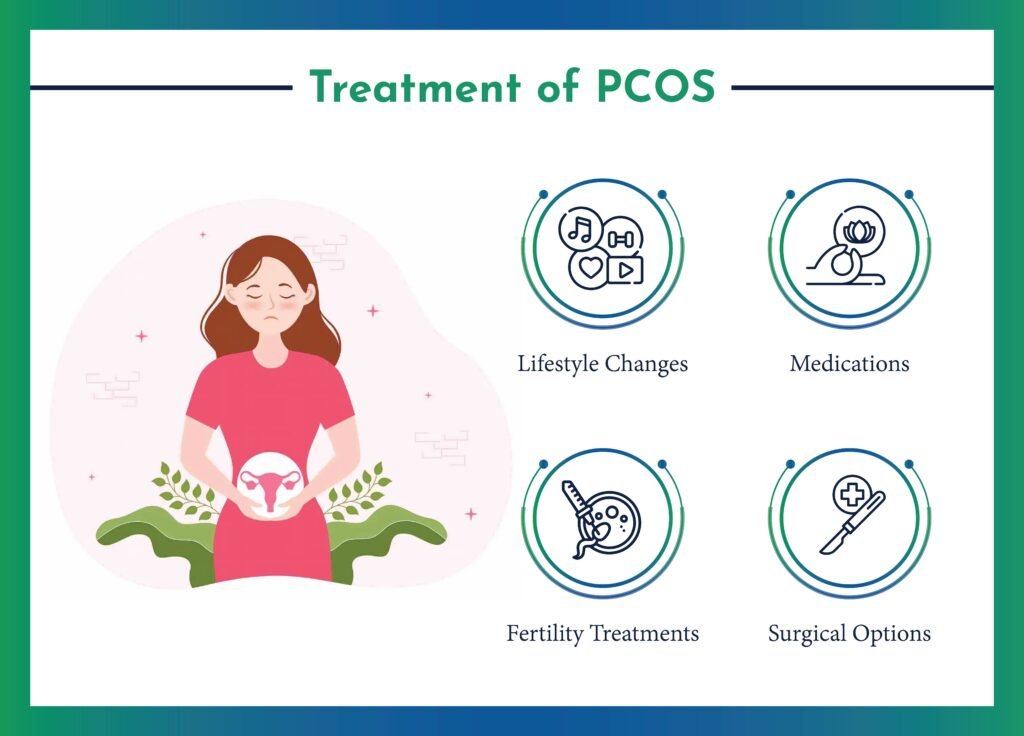
What is PCOS ?
Polycystic Ovary Syndrome (PCOS) is a hormonal condition that affects many women, often showing up as irregular periods, stubborn acne, hair thinning, weight gain, or trouble getting pregnant. While the exact cause isn’t fully understood, it’s linked to things like insulin resistance and genetics.
Living with PCOS can feel overwhelming, but it’s manageable with the right steps. Small lifestyle changes, like eating a balanced diet, staying active, and managing stress, can make a big difference. Some women also benefit from medications or hormonal treatments to tackle specific symptoms.
PCOS looks different for everyone, but with patience and support, it’s possible to take control of your symptoms and live a healthy, empowered life.

Why does PCOS happens ?
PCOS (Polycystic Ovary Syndrome) happens when the body produces too many male hormones (androgens), which messes with how the ovaries function. Here’s why it might happen:
- Hormonal Imbalance: With PCOS, the ovaries produce more androgens than normal, which can mess with your periods and make it harder to release eggs.
- Insulin Resistance: Many women with PCOS struggle with insulin resistance, meaning the body doesn’t use insulin properly. This causes insulin levels to rise, which can trigger more hormone imbalances.
- Genetics: PCOS tends to run in families, so if a close relative has it, you might be more likely to develop it too.
- Ovary Cysts: In some cases, small cysts can form on the ovaries because the follicles don’t mature or release eggs as they should. Not all women with PCOS have cysts, though.
While the exact cause is still unclear, it’s thought that a mix of genetic factors and lifestyle habits can contribute. The good news is, managing things like diet, exercise, and stress can help keep symptoms in check. Understanding why PCOS happens is the first step toward taking control and living a healthier life.
Lifestyle Changes in PCOS
Making lifestyle changes is key to managing PCOS, and it doesn’t have to be overwhelming. Here’s how small tweaks can make a big difference:
- Healthy Eating: Focus on a balanced diet with lots of whole foods—fruits, vegetables, lean proteins, and whole grains. Reducing processed foods and sugar can help with insulin resistance, which is common in PCOS.
- Exercise Regularly: Whether it’s walking, yoga, or strength training, staying active helps manage weight, balance hormones, and improve insulin sensitivity. Even a little movement goes a long way.
- Stress Management: High stress can make PCOS symptoms worse. Finding ways to relax, like meditation, deep breathing, or just taking time for yourself, can really help.
- Sleep Well: Getting enough quality sleep each night supports hormonal balance and overall health.
- Avoiding Smoking and Excess Alcohol: These can worsen insulin resistance and hormone imbalances, so cutting back can have a positive effect.
Making these changes doesn’t mean being perfect—it’s about progress. Start with one or two things, and go from there!

Types of PCOS and their symptoms
There are a few types of PCOS, and each one has different causes and symptoms:
Insulin-Resistant PCOS (Classic PCOS):
This is the most common type. It happens when your body has trouble using insulin, which can cause weight gain, acne, and extra hair growth. Symptoms: Weight gain, especially around the belly, acne, excessive hair growth (like on the face or chin), thinning hair on the scalp, irregular periods, and difficulty getting pregnant.Post-Pill PCOS:
This type shows up after stopping birth control. Hormones can go out of balance, leading to irregular periods and other PCOS symptoms, but it usually gets better after a few months. Symptoms: Irregular or missed periods, acne, ovarian cysts.Inflammatory PCOS:
This happens when there’s too much inflammation in the body, which can make insulin resistance and hormone problems worse. It’s more common in women who have stress or autoimmune issues. Symptoms: Acne, weight gain, fatigue, and irregular periodsAdrenal PCOS:
This type happens when the adrenal glands make too many male hormones. It causes symptoms like acne and hair loss but doesn’t usually involve weight gain or insulin issues. Symptoms: Acne, hair loss, oily skin, and irregular periods.

Treatment for PCOS
Treating PCOS often involves a combination of lifestyle changes and medical treatments tailored to manage symptoms. Here’s how it works:
-
Lifestyle Changes:
A healthy diet and regular exercise help manage weight, insulin resistance, and hormone levels. Reducing stress through relaxation techniques also plays a key role. -
Medications:
- Birth Control Pills: These regulate periods, reduce acne, and control excessive hair growth by balancing hormones.
- Metformin: Commonly used to manage insulin resistance, it helps lower blood sugar and may also assist with weight management.
- Anti-androgens (e.g., Spironolactone): These block male hormones, reducing unwanted hair growth and acne.
- Fertility Medications: For women struggling with conception, Clomid or letrozole may help stimulate ovulation. In more complex cases, IVF (in vitro fertilization) may be considered.
-
Hospital Treatments:
If lifestyle changes and medications aren’t enough, treatments like ovarian drilling (a surgical procedure) may be suggested for women trying to conceive. Laser hair removal and other dermatological treatments can help with skin-related symptoms.
Treatment plans are personalized, so working closely with a healthcare provider is essential.
Follow me @shikha.agewal02, for more such health insights.
For direct consultation, Whatsapp me at +91 824 002 2632
